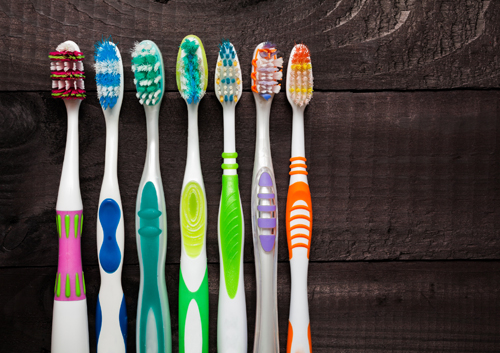March 6th, 2024

If you were to put your toothbrush bristles under a high-powered microscope, what you would see might give you nightmares: millions of bacteria, busily crawling up and down your toothbrush bristles, consuming proteins that came from your mouth, and still clinging to the bristles even after you’ve rinsed them with water.
Rinsing your toothbrush after brushing removes some of those ferociously hungry bacteria, but not all. The American Dental Association says that bacterial infestations develop on toothbrushes within a month of daily use. The ADA also states that unless a toothbrush is sterilized before being packaged, it’s going to come with bacteria – free of charge!
Germs and Frayed Bristles: the Demise of a Toothbrush
Dr. Irwin Seidman and our staff recommend that you toss your old toothbrush in the trash and purchase a new one every three months. Children tend to bite on their toothbrushes, which makes the bristles degrade and fray faster. Chances are kids may need to have their toothbrushes changed more frequently.
Where do they hide?
Bacteria are tenacious little germs that head for those concealed areas between toothbrush bristles. They are highly adaptable and exist in every type of extreme environment. Some people actually go so far as to put their toothbrush in a microwave for a few seconds to kill germs, but this doesn't always work either. In fact, you may only end up with a toothbrush that’s as bendable as a Gumby doll – and still covered with germs.
Feed a Cold, Starve a Fever, and Get Rid of Your Toothbrush
When you have a head cold, your mouth is teeming with bacteria gleefully roaming around, and gobbling mucus and dead skin cells. If you brush your teeth while suffering a sinus condition, the brush will act like a magnet for ravenous bacteria. Use your old toothbrush while you are sick, but as soon as you feel better, throw it away and get a new one. Otherwise you could possibly re-infect yourself with the same cold germs!
February 29th, 2024

Many of our young patients experience anxiety during dental appointments. Dr. Irwin Seidman and our team want to help your child overcome any fear he or she may feel when coming in for regular visits.
If you know your child suffers from anxiety during dental checkups, nitrous oxide sedation, popularly known as “laughing gas,” may be helpful. Nitrous oxide can be used during many types of dental procedures.
It has a sweet odor and taste, and gets mixed with oxygen when supplied through a mask. The effects typically kick in within a few minutes and leave your child feeling calm and relaxed.
Nitrous is helpful because your child will stay conscious and able to move and answer questions the doctor may ask. The drug is also convenient because the effects go away within a few minutes after the mask is removed.
Nitrous oxide is not dangerous when it’s combined with oxygen. It is non-addictive and non-allergenic. When used properly, nitrous oxide reduces anxiety, while allowing continued communication between the patient and dentist during a procedure. It can also help alleviate pain or discomfort during exams.
You should know that nitrous oxide may cause nausea in up to ten percent of patients. This drug is not recommended for people who suffer from certain medical conditions. We recommend discussing this method with Dr. Irwin Seidman if your child's dental anxiety begins to interfere with his or her appointments.
We want all our patients to feel comfortable during their care. Talk with Dr. Irwin Seidman at your child's next appointment to find out if nitrous oxide is an option. If you have questions regarding nitrous oxide, call our Palatine, IL location and we’ll be happy to answer them.
February 21st, 2024

If you have been bringing your baby in for regular checkups since that first tooth arrived, you might expect that he or she is already familiar with Dr. Irwin Seidman and our staff. Often, though, months pass between visits, which is a very long time for a child. How can you make your preschooler’s return visit a happy one? We have some suggestions!
Before Your Visit
- Prepare your child for her visit. Simple explanations are best for a young child. You might tell your daughter that a dentist is a doctor who helps keep her teeth strong and healthy. Let her know a bit about what will happen. Being told, “You will sit in a special chair,” or, “Can you open wide so we can count your teeth?” will give her some idea of what it’s like to visit our office.
- There are many entertaining books for young children about visiting the dentist. Reading some of these to her for a few days before the appointment will let her know what to expect.
- Use playtime to prepare. You might count your daughter’s teeth or let her “play dentist” and brush the teeth of her favorite doll or stuffed animal.
When You Arrive
- Your attitude can be contagious! If you treat a visit to the dentist like any other outing, chances are your child will too. Your calm presence is exactly what your child needs.
- You might want to come a bit early to let your son explore the office. Bring a favorite toy or book to keep him entertained if you need to. A favorite stuffed toy can be a comfort in an unfamiliar place.
- If you are with your child during his checkup, follow our lead. Don’t be concerned if your child seems uncooperative at first or even throws a tantrum—we are used to working with children, and have techniques to make his experience as relaxed and as positive as we possibly can.
We Are Here to Help
We are your partners in your child’s dental care. Call our Palatine, IL office anytime for suggestions about making your child’s visit a comfortable, comforting experience. Our goal is to start your child confidently on the road to a lifetime of empowering dental visits and lasting dental health.
February 15th, 2024

In a perfect world, we would all jump out of bed ready to greet the day with a big smile and a toothbrush close at hand to clean our teeth immediately. But if you can’t even find your toothbrush before you’ve had your first cup of coffee, does it really make a difference if you brush and floss after breakfast? Perhaps! Let’s talk biology.
Normal saliva production during the day benefits our teeth and mouths in surprising ways. Saliva washes away food particles to keep our teeth cleaner. It contains cells which combat bacteria and infection. It even provides proteins and minerals to help protect our teeth from decay. But saliva production slows dramatically as we sleep, and the amount of bacteria in our mouths increases. While one of the nasty—and obvious—side effects of bacterial growth is morning breath, there is an invisible effect, which is more harmful. Bacteria in plaque convert sugar and carbohydrates into acids which attack our gums and enamel and can lead to both gingivitis and cavities.
- If You Brush Before Breakfast
Brushing and flossing first thing in the morning removes the plaque that has built up during the night and takes care of many of the bacteria who are ready to enjoy the sugar and carbs in that breakfast with you. If you brush before eating breakfast, rinse your mouth with water after your meal, floss if needed, and you are good to go.
- If You Choose to Brush After Breakfast
But if you decide that doughnut simply can’t wait, you should ideally postpone brushing for 20-30 minutes after your meal. Of course, these are minutes in which bacteria can make use of those new sugars and carbohydrates. So why shouldn’t you brush immediately after eating? Many foods and beverages, especially acidic ones such as grapefruit and orange juice, can weaken the surface of your teeth. If you rinse with water after eating and wait at least 20-30 minutes before brushing, your enamel will be “remineralized” (another benefit of saliva) and ready for cleaning.
No matter if you take a “seize the day” approach and brush first thing in the morning, or a “seize the doughnut” approach and brush soon after eating, the important word here is “brushing.” Dr. Irwin Seidman and our Palatine, IL team are happy to make suggestions as to the best morning routine for you. One thing is certain: if you give your teeth and gums two minutes of careful brushing and flossing in the morning, you can’t help but start your day off right!






 Website Powered by Sesame 24-7™
Website Powered by Sesame 24-7™